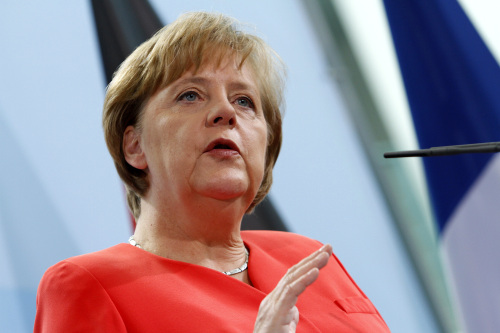BERLIN (AP) ― A full-scale restructuring of Greek debt would have “completely uncontrollable” effects on financial markets and could threaten other countries’ stability, German Chancellor Angela Merkel warned on Wednesday.
Imposing a so-called haircut on Greek debt ― reducing the amount to be repaid ― would endanger not only banks and other creditors who hold Greek bonds, but also institutions that sold insurance policies against a default, Merkel said.
Those credit default swaps have a “significantly higher” face value than the debt itself, and the consequences of them being called on can’t be foreseen, she said.
“Nobody around the globe knows exactly who holds those papers and what it means if they come due,” Merkel told a meeting of the German parliament’s European affairs committee. She said it was also unclear “who will have to pay how much and who will need fresh capital in what way.”

Angela Merkel (Bloomberg)
The chancellor added that the CDS contracts ― derivatives that also played a central role during the financial crisis after the collapse of Lehman Brothers ― are currently not regulated, but “must be made transparent” amid efforts to tighten financial regulation.
A full-scale debt restructuring also could prove contagious, leading investors to question the stability of other European nations that otherwise would not need assistance from the EU to meet their financing needs, she said.
The chancellor wants to get private creditors to contribute to the next aid package for Greece on a purely voluntary basis, an initiative for which Merkel doesn’t yet have a majority among the leaders of the 27 EU nations holding a summit in Brussels on Thursday and Friday.
However, Merkel voiced confidence that other EU leaders would follow Germany, France and the Netherlands in supporting the idea.
It remains unclear how much money might be contributed by private creditors, but Merkel insisted it must be “substantial ... and measurable.”
The EU summit comes after Greek Prime Minister George Papandreou survived a vote of no-confidence early Wednesday, paving the way for an even tougher vote next week on the adoption of a new package of austerity measures.
Merkel said she telephoned Papandreou on Wednesday to congratulate him on winning the confidence vote. However, as she briefed lawmakers in Berlin, she left no doubt that further assistance for Greece would only be considered if the Greek government delivers on its pledges.
Adopting the new set of austerity measures “is the required precondition to discuss the question of a new program,” she said.
As borrowing costs for Greece remain prohibitive, Athens cannot return to bond markets as foreseen under last year’s euro110 billion loan package by the EU, the ECB and the International Monetary Fund, requiring a new bailout to meet its financing needs.
The new program ― likely to figure high on the EU summit’s agenda ― is expected to be of a similar amount to last year’s aid package and is meant to secure Greece’s financing needs through 2014.
With the Greek economy already in recession and yet more austerity measures to come, EU Commission President Jose Manuel Barroso said that the EU summit would also discuss the use of a “significant amount” of dormant funds to help kick start Greece’s economy again.
“The commission is now proposing an exceptional response as a sign to the Greek people that there is hope,” he told the European Parliament.
The EU currently holds some euro15 billion in development funds earmarked for Greece between 2007 and 2013 as Greece struggles to show it can put them to work efficiently and come up with its 50 percent of the funding for any proposed project.
Barroso first proposed Tuesday that the rules be loosened for Greece so that about euro1 billion can be used as a stimulus package, albeit with tight oversight by experts from the EU Commission and member states.
“The fact that we’re only talking about a stimulus program for Greece now is saddening,” said Jorgo Chatzimarkakis, a member of the European Parliament for the German Free Democrats. He advocates the EU should release all the funds currently blocked to support the economy and “set a light at the end of the tunnel for the people in Greece.”






![[KH Explains] How should Korea adjust its trade defenses against Chinese EVs?](http://res.heraldm.com/phpwas/restmb_idxmake.php?idx=645&simg=/content/image/2024/04/15/20240415050562_0.jpg&u=20240415144419)